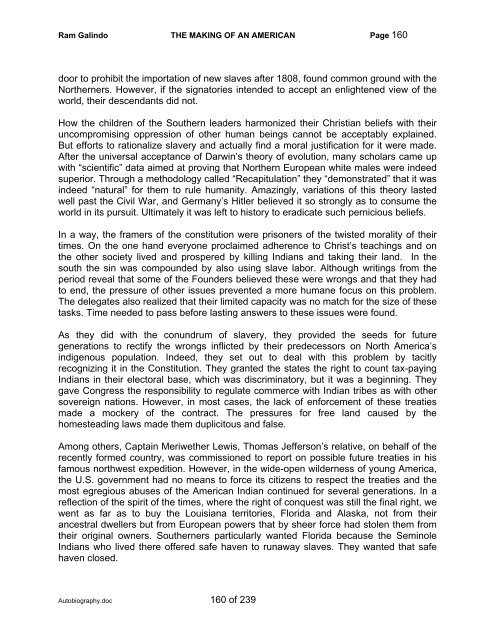Autobiography - The Galindo Group
Autobiography - The Galindo Group
Autobiography - The Galindo Group
You also want an ePaper? Increase the reach of your titles
YUMPU automatically turns print PDFs into web optimized ePapers that Google loves.
Ram <strong>Galindo</strong> THE MAKING OF AN AMERICAN Page 160<br />
door to prohibit the importation of new slaves after 1808, found common ground with the<br />
Northerners. However, if the signatories intended to accept an enlightened view of the<br />
world, their descendants did not.<br />
How the children of the Southern leaders harmonized their Christian beliefs with their<br />
uncompromising oppression of other human beings cannot be acceptably explained.<br />
But efforts to rationalize slavery and actually find a moral justification for it were made.<br />
After the universal acceptance of Darwin’s theory of evolution, many scholars came up<br />
with “scientific” data aimed at proving that Northern European white males were indeed<br />
superior. Through a methodology called “Recapitulation” they “demonstrated” that it was<br />
indeed “natural” for them to rule humanity. Amazingly, variations of this theory lasted<br />
well past the Civil War, and Germany’s Hitler believed it so strongly as to consume the<br />
world in its pursuit. Ultimately it was left to history to eradicate such pernicious beliefs.<br />
In a way, the framers of the constitution were prisoners of the twisted morality of their<br />
times. On the one hand everyone proclaimed adherence to Christ’s teachings and on<br />
the other society lived and prospered by killing Indians and taking their land. In the<br />
south the sin was compounded by also using slave labor. Although writings from the<br />
period reveal that some of the Founders believed these were wrongs and that they had<br />
to end, the pressure of other issues prevented a more humane focus on this problem.<br />
<strong>The</strong> delegates also realized that their limited capacity was no match for the size of these<br />
tasks. Time needed to pass before lasting answers to these issues were found.<br />
As they did with the conundrum of slavery, they provided the seeds for future<br />
generations to rectify the wrongs inflicted by their predecessors on North America’s<br />
indigenous population. Indeed, they set out to deal with this problem by tacitly<br />
recognizing it in the Constitution. <strong>The</strong>y granted the states the right to count tax-paying<br />
Indians in their electoral base, which was discriminatory, but it was a beginning. <strong>The</strong>y<br />
gave Congress the responsibility to regulate commerce with Indian tribes as with other<br />
sovereign nations. However, in most cases, the lack of enforcement of these treaties<br />
made a mockery of the contract. <strong>The</strong> pressures for free land caused by the<br />
homesteading laws made them duplicitous and false.<br />
Among others, Captain Meriwether Lewis, Thomas Jefferson’s relative, on behalf of the<br />
recently formed country, was commissioned to report on possible future treaties in his<br />
famous northwest expedition. However, in the wide-open wilderness of young America,<br />
the U.S. government had no means to force its citizens to respect the treaties and the<br />
most egregious abuses of the American Indian continued for several generations. In a<br />
reflection of the spirit of the times, where the right of conquest was still the final right, we<br />
went as far as to buy the Louisiana territories, Florida and Alaska, not from their<br />
ancestral dwellers but from European powers that by sheer force had stolen them from<br />
their original owners. Southerners particularly wanted Florida because the Seminole<br />
Indians who lived there offered safe haven to runaway slaves. <strong>The</strong>y wanted that safe<br />
haven closed.<br />
<strong>Autobiography</strong>.doc 160 of 239


